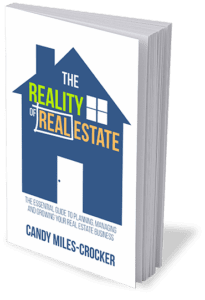
 You don’t need me to tell you how difficult it is to sell a house these days. Between the unreasonable buyers and sellers, the changing financial market and tight appraisals, you never know if your contract will make it to the closing table.
There is one part of the real estate transaction that you may be able to influence…the home inspection. Here are 4 simple tips that you can implement today to move this important part of the home buying process to a successful conclusion.
You don’t need me to tell you how difficult it is to sell a house these days. Between the unreasonable buyers and sellers, the changing financial market and tight appraisals, you never know if your contract will make it to the closing table.
There is one part of the real estate transaction that you may be able to influence…the home inspection. Here are 4 simple tips that you can implement today to move this important part of the home buying process to a successful conclusion.
1. Discuss At The First Buyer Meeting
At your first buyer meeting, discuss the purpose of the home inspection. The inspection is not designed to see if a property is up to the current codes in the market. It is designed to help the buyer know what’s going on with the property and to prioritize any repairs that may be needed. You should also discuss the typical items that can be found during the inspection. Let your buyers know the types of deadlines they will have to work with.2. Discuss When Writing the Offer
When you write the offer, discuss how the home inspection contingency works. Although you discussed this at the first buyer meeting, they have probably forgotten what you said. Review it again. Discuss what types of items are typically uncovered. You may have seen a few issues when you were showing the home that you want the inspector to review more thoroughly.3. Discuss The Home Inspection Before The Inspection
Before the home inspection begins, review the purpose of the home inspection with your buyers and the typical issues they can expect to see during the inspection. If there were any repair items negotiated in the contract, remind the buyers of those items.4. Summarize the Home Inspection
Throughout the home inspection, give a brief summary of the items that need repair. I like to do this after the inspector completes looking at the various floors or rooms in the house. For example, after the inspector completes inspecting the exterior, I will give a summary of issues found, if any. Then, when the basement is completed, I summarize any exterior issues AND any basement issues. If you notice a pattern here. That was my intent. As the old saying goes, “tell ’em what you’re going to tell ’em, tell ’em, tell ’em what you told ’em”. Our job is to educate our clients. In following these 4 simple tips, you will not only educate your clients, but you will also manage their expectations and hopefully make your job a little easier in the long run. Be prosperous!
Enjoy less stress by having smoother transactions by implementing these simple strategies today!
Sign up today for my Free Email Course, 5 Things Every New Real Estate Agent Needs to Know. Start building your real estate business on a solid foundation. Click here to get started.Get Real-Life Training and Awesome Results With Real-Life Real Estate Training
- Have you struggled turning contacts into clients?
- Are you working hard, but hardly making any money?
- Are you beginning to think you made a bad career choice?

Let’s Go to Work!

As an active Realtor licensed in three jurisdictions, I approach real estate training from a different perspective. With over 18 years in the real estate business, I teach agents what it’s really like to be a real estate agent.






